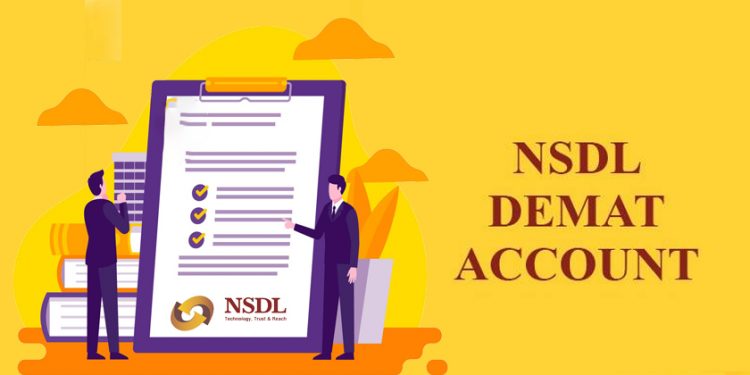Imagine a vault, not for your tangible assets, but for your financial securities. That’s exactly what NSDL account all about. It’s a digital treasure chest where you can safely store your investments. Founded in August 1996, the National Securities Depository Limited (NSDL) revolutionised the Indian capital market by pioneering this electronic storage, effectively ending the era of paper certificates. Since its inception, NSDL has been instrumental in streamlining India’s capital market, driving its growth and development to new heights. Read on to learn more about an NSDL account.
Topics Covered
- How to Open an NSDL Demat Account?
- Benefits of Having an NSDL Demat Account
- Types of Securities That Can Be Held in an NSDL Account
- How to Transact with an NSDL Account
- NSDL Account Charges
- Tax Implications of an NSDL Account
- NSDL vs CDSL
- Conclusion
How to Open an NSDL Demat Account?
Now that you know what NSDL Demat account is, let’s understand how to open one. NSDL account can be a regular Demat account, repatriable Demat account, or non-repatriable Demat Account. So to open an account with a reputed Depository Participant (DP) like Religare Broking, you need to follow the below-mentioned steps.
- Visit the Religare Broking website – www.religareonline.com
- Fill out the online application with the required details
- Submit the necessary documents
- Wait for the in-person verification from the Religare team
- Once the verification is complete, the account will be opened.
Your Path to Paperless Trading. Take the First Step with Religare Broking
Benefits of Having an NSDL Demat Account
Having an NSDL Account offers numerous advantages that greatly simplify the investment process, making it more accessible and efficient for individuals. Here are some exciting benefits.
Recommended Read: What is Demat Account
-
Safe and Secure Way of Holding Securities
With an NSDL account, your securities are stored digitally, eliminating the risk of loss or damage that comes with physical documents. NSDL also employs state-of-the-art technology and security measures to ensure safety from cyber threats.
-
Easy and Convenient Access to Securities
An NSDL account allows you to access and manage your investments anywhere and anytime. This is especially beneficial in today’s fast-paced world, where timely access to your investments can make a significant difference.
-
Cost-Effective
Digital storage and management of securities eliminate costs associated with physical documents, such as stamp duty, handling charges, and storage costs, making NSDL a cost-effective solution for investors.
Types of Securities That Can Be Held in an NSDL Account
NSDL provides a wide array of securities that you can hold in your account. This variety offers investors the flexibility to diversify their portfolios as per their investment goals and risk tolerance. Some of the commonly held securities in an NSDL account include the following.
-
Equity Shares
Stocks or equity shares represent your ownership in a company. Holding these shares in a demat account with NSDL makes it easier to trade them in the stock market.
-
Debt Securities
Debt securities like bonds and debentures can also be held in an NSDL account. These are investment options where you lend money to an entity (like the government or a corporation) in return for interest income.
-
Mutual Funds
Mutual funds are investment vehicles designed to pool money from various investors to invest in a diversified portfolio of stocks, bonds, or other securities. Units of these funds can be held and transacted in your NSDL account.
How to Transact with an NSDL Account
Transactions with an NSDL account are simple and convenient. You can buy or sell securities, convert physical securities into electronic form (dematerialisation), or convert electronic securities back to physical form (rematerialisation). You can also pledge or unpledge securities as collateral against a loan.
NSDL Account Charges
There is a cost for everything, and that also applies to owning an NSDL account. Opening an NSDL account involves certain charges, including account opening charges, annual maintenance fees, and transaction charges. In addition, there may be other costs associated with additional services provided by your DP, such as dematerialisation or rematerialisation of securities.
Recommended Read: How to open demat Account ?
Tax Implications of an NSDL Account
Like any financial adventure, your journey with an NSDL account comes with its own tax implications. The tax implications for an NSDL account holder depend on the type of income generated. Long-term and short-term capital gains tax apply to profits from the sale of securities. Dividends and interest income may also be taxable, subject to current tax laws. You can consult a tax expert on the exact tax implications of an NSDL account.
NSDL vs CDSL
National Securities Depository Limited (NSDL) and Central Depository Services Limited (CDSL) are the two main depositories in India that hold securities such as shares, bonds, and mutual funds in an electronic or ‘dematerialised’ format. Both play a pivotal role in facilitating seamless trade in the Indian securities market, but there are some key differences between the two.
When it comes to functionality, both NSDL and CDSL offer similar services. For example, they enable the holding and transacting of securities in demat form, making the process faster, safer, and more efficient. However, the choice between NSDL and CDSL often comes down to the Depository Participant (DP) you choose, as DPs typically have affiliations with either NSDL or CDSL.
Conclusion
An NSDL account is a valuable tool for any investor, offering convenience, safety, and cost-effectiveness. It provides a comprehensive platform to hold a wide range of securities, making investment management a seamless process. As we navigate through the era of digitalisation, having an NSDL account is more than just a choice; it’s a necessity for modern investing. Open an NSDL account with Religare Broking today
Recommended Read: Demat Account Vs Trading Account




















